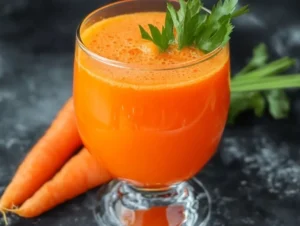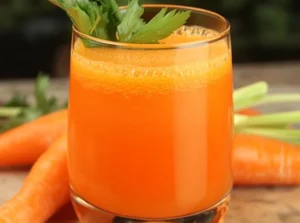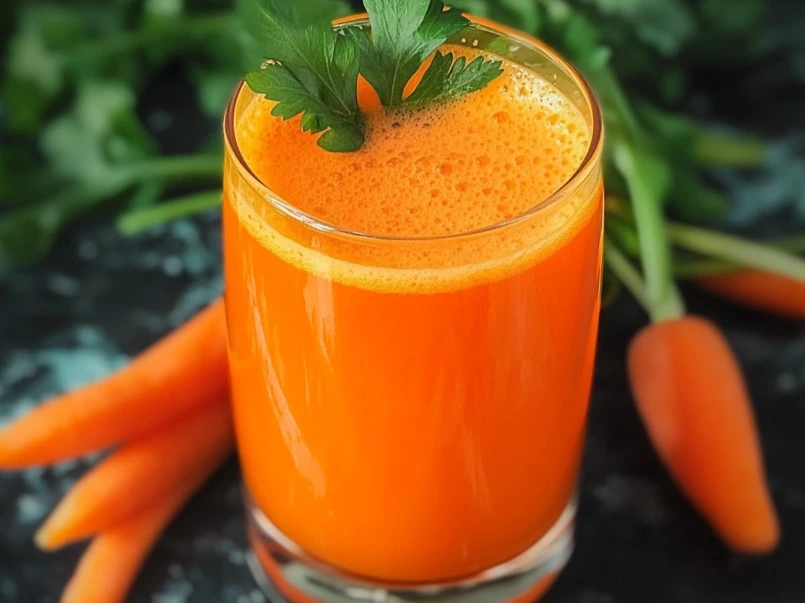Carrot juice is a popular, nutrient-packed drink that’s easy to make at home. In this guide, we’ll show you the best carrot juice recipe, along with tips to customize its flavor and maximize its health benefits. Whether you enjoy it as a refreshing drink or pair it with your meals, carrot juice is a versatile addition to your diet.
Historically, carrot juice has held significance in various cultures. Ancient civilizations, such as the Greeks and Romans, recognized the health benefits of carrots, using them both as food and medicine. In Ayurveda and traditional Chinese medicine, carrots and their extracts were revered for their healing properties. Over time, carrot juice evolved into a globally embraced health drink, cherished for its unique flavor and restorative qualities.
Why Make Carrot Juice at Home?
Advantages of Fresh Homemade Carrot Juice
Making carrot juice at home offers unparalleled benefits compared to pre-packaged versions. Freshly prepared juice retains the full spectrum of nutrients, as it is free from preservatives, additives, and excessive sugar often found in store-bought varieties. Additionally, homemade juice provides the opportunity to use organic carrots, ensuring a cleaner and more natural beverage.
The flavor of fresh carrot juice is also unmatched—its natural sweetness shines through without any artificial enhancements. Preparing it at home allows you to customize the recipe by adding other fruits, vegetables, or spices to suit your taste and nutritional needs.
Comparing Homemade Juice with Store-Bought Alternatives
Store-bought carrot juice, while convenient, often falls short in terms of nutrition and freshness. Commercially produced juices are typically pasteurized, a process that extends shelf life but also reduces the levels of beneficial enzymes and vitamins. Furthermore, many packaged juices contain added sugars, artificial flavors, and preservatives that detract from the natural goodness of the drink.
Homemade carrot juice, on the other hand, is a cost-effective option that guarantees quality and freshness. By making your juice at home, you have control over every ingredient, ensuring a healthier and more satisfying experience. It’s a simple yet rewarding way to incorporate a nutrient-rich drink into your daily routine.
Nutritional Benefits of Carrot Juice
Carrot juice is a nutritional powerhouse, loaded with vitamins and minerals essential for your health. Carrots are a rich source of Vitamin A, which supports good vision, strong immunity, and healthy skin. They also provide significant amounts of Vitamin K, potassium, and fiber, making them excellent for overall wellness.
One of the key benefits of carrot juice lies in its antioxidants. These natural compounds help protect the body from harmful free radicals, which can damage cells and contribute to aging and disease. Antioxidants in carrot juice, such as beta-carotene and lutein, are particularly good for maintaining eye health and reducing inflammation. By drinking carrot juice, you can give your body a nutritious boost with every sip.
Essential Ingredients for a Carrot Juice Recipe
Creating carrot juice starts with the right ingredients. The most important component is, of course, fresh carrots. Opt for organic varieties when possible to avoid pesticide residues. Different types of carrots, like Nantes, Imperator, or rainbow carrots, can add unique flavors and colors to your juice.
To elevate the taste and health benefits, consider adding optional extras. Fresh ginger gives the juice a spicy kick and helps with digestion. Lemon adds brightness and Vitamin C. Apples provide natural sweetness, while spices like cinnamon or turmeric add depth and additional health benefits. Customizing your juice allows you to experiment with flavors while maximizing its nutritional value.
Equipment Needed for Carrot Juice
The right tools make preparing carrot juice easy and enjoyable. Juicers are the most common choice, and there are two main types to consider:
- Centrifugal Juicers: These are fast and efficient, ideal for quick juicing.
- Masticating Juicers: Slower but more effective at extracting juice, they retain more nutrients and work well for leafy greens too.

Step-by-Step Guide to Making Carrot Juice
Preparing the Carrots
Start by selecting fresh, firm carrots for the best flavor and nutrition. Wash them thoroughly under running water to remove dirt or debris. For organic carrots, peeling may not be necessary, but for non-organic ones, peeling helps eliminate pesticide residues. Chop the carrots into smaller pieces to make them easier to process, especially if you’re using a blender.
Extracting Juice Using a Juicer or Blender
- Using a Juicer:
Place the chopped carrots into the juicer’s feeding chute. Turn on the machine and let it extract the juice. Collect the juice in a clean container and discard the pulp or repurpose it in recipes like muffins or soups. - Using a Blender:
Add the chopped carrots to your blender along with a cup of water. Blend until the mixture becomes smooth. Strain the juice through a fine-mesh sieve or nut milk bag to remove the pulp. Squeeze out as much liquid as possible for a clear, refreshing drink.
Enhancing the Flavor of Carrot Juice
Carrot juice is naturally sweet, but adding other ingredients can elevate its taste and make it even more enjoyable:
- Natural Sweeteners: Add a spoonful of honey or maple syrup to enhance the sweetness if needed. These natural options keep your juice healthy while improving the flavor.
- Herbs and Spices: A pinch of cinnamon or nutmeg adds warmth and depth to the juice. Fresh mint leaves or a dash of ginger can give it a refreshing twist.
Customizing Your Carrot Juice Recipe
Carrot juice is incredibly versatile, allowing you to customize it to your liking. Here are a few ideas:
- Balancing Flavors with Fruit: Mix in fruits like oranges or pineapples to add a tangy or tropical flair. These fruits complement the natural sweetness of carrots beautifully.
- Creating Detox Blends: Add turmeric for its anti-inflammatory properties or celery for a cleansing effect. Pair these with lemon or cucumber for a refreshing and health-focused drink.
Storing and Preserving Carrot Juice
Best Practices for Refrigeration
To keep your carrot juice fresh, it’s important to store it properly. First, transfer the juice into an airtight container to prevent exposure to air, which can lead to oxidation and nutrient loss. Glass containers, such as mason jars, are a great option because they preserve freshness better than plastic. Additionally, make sure to refrigerate the juice immediately after preparation to maintain its flavor and nutritional value.

How Long Fresh Carrot Juice Stays Good
Fresh carrot juice stays good for up to 48 hours when stored in the refrigerator. However, it’s best to consume it as soon as possible to enjoy its full health benefits. If you notice changes in color, taste, or smell, it’s a sign the juice has spoiled. Freezing is another option if you want to store the juice for a longer time, but freezing may slightly alter the flavor and texture.
Health Benefits of Carrot Juice
Boosting Immunity
Carrot juice is packed with nutrients that help strengthen the immune system. The high levels of Vitamin A support the body’s natural defenses by improving the function of white blood cells, which fight infections. Furthermore, the antioxidants in carrot juice reduce inflammation and protect against harmful free radicals, keeping your body strong and resilient.
Enhancing Skin Health
Drinking carrot juice regularly can improve your skin’s appearance. Thanks to its high content of beta-carotene, carrot juice promotes healthy skin by reducing dryness and protecting against sun damage. In addition, Vitamin C in the juice supports collagen production, which keeps the skin firm and youthful. By adding carrot juice to your routine, you can nourish your skin from the inside out.
Carrot Juice for Weight Loss
Why It’s Low in Calories and High in Nutrients
Carrot juice is an excellent choice for weight loss because it’s naturally low in calories while being rich in essential nutrients. A single serving is filling, thanks to its fiber content, yet it won’t add many calories to your diet. Moreover, its natural sweetness can satisfy sugar cravings, making it a healthier alternative to sugary snacks or drinks.
How to Incorporate It into a Weight-Loss Plan
To include carrot juice in your weight-loss plan, start by drinking it as a mid-morning or afternoon snack. Pair it with a handful of nuts or a boiled egg for a balanced mini-meal. You can also use carrot juice as a base for smoothies, combining it with fruits like berries or spinach for added nutrition. Additionally, substituting carrot juice for sugary beverages is an easy way to reduce calorie intake without sacrificing flavor.
Variations of Carrot Juice Recipes Around the World
Regional Recipes and Techniques
Carrot juice takes on unique flavors and preparations in different parts of the world. In the Middle East, carrot juice is often blended with orange juice for a tangy, refreshing drink. Sometimes, a hint of rose water is added for an aromatic twist. In India, carrot juice is commonly paired with ginger and lemon to create a zesty, health-boosting beverage.
In the Caribbean, carrot juice is transformed into a creamy treat by mixing it with condensed milk, vanilla, and spices like nutmeg or cinnamon. This variation is more dessert-like but still rich in nutrients. Meanwhile, in Japan, carrot juice is often combined with apples to create a naturally sweet and mild drink that appeals to all age groups.
Popular Combinations in Global Cuisines
Across the globe, carrot juice is frequently customized with local ingredients. In tropical regions, carrots are blended with mangoes or pineapples to create a vibrant and tropical drink. In colder climates, spices like cinnamon, clove, or turmeric are added to create a warming beverage. These regional twists not only showcase the versatility of carrot juice but also reflect the diverse culinary traditions around the world.
Common Issues When Making Carrot Juice
Troubleshooting Bitterness
Bitterness in carrot juice can be caused by using carrots that are too mature or stored improperly. To avoid this, choose fresh, tender carrots with a bright orange color. If your juice still tastes bitter, balance it by adding naturally sweet ingredients like apples, oranges, or a teaspoon of honey. A squeeze of lemon juice can also help neutralize the bitterness.
Overcoming Issues with Consistency
Carrot juice that is too thick or gritty can be unpleasant to drink. To fix this, ensure the carrots are chopped into smaller pieces before juicing or blending. For blender-made juice, straining the mixture through a fine sieve or nut milk bag removes pulp and results in a smoother texture. Adding a little water or a splash of another juice, such as orange or apple, can also improve consistency while enhancing the flavor.
FAQs About Carrot Juice Recipe
1. Is it OK to drink carrot juice every day?
Yes, drinking carrot juice daily is generally safe and beneficial for most people. Carrot juice is packed with essential nutrients like Vitamin A, Vitamin K, and antioxidants that support overall health. However, moderation is key. Drinking too much carrot juice can lead to a condition called carotenemia, which causes the skin to turn slightly yellow-orange due to excessive beta-carotene intake. To avoid this, limit your daily consumption to one glass (about 8 ounces).
2. What fruits pair with carrots?
Carrots pair wonderfully with a variety of fruits, making the juice more flavorful and nutritious. Popular choices include:
- Oranges: Add a citrusy zing and boost Vitamin C.
- Apples: Complement the sweetness of carrots while adding a mild tartness.
- Pineapples: Provide a tropical twist and extra sweetness.
- Mangoes: Create a creamy, exotic flavor profile.
These combinations can be adjusted based on your preferences and available ingredients.
3. Do you need to peel carrots before juicing?
Peeling carrots is not always necessary, especially if you’re using organic ones. Washing them thoroughly under running water is usually enough to remove dirt and impurities. However, for conventionally grown carrots, peeling is recommended to reduce exposure to pesticides or to eliminate any bitter taste from the skin. Ultimately, whether to peel or not depends on your preference and the quality of the carrots.
4. Is carrot juice a natural laxative?
Yes, carrot juice can act as a mild natural laxative. It is high in dietary fiber, which promotes healthy digestion and regular bowel movements. Additionally, the hydration and nutrients in carrot juice can help prevent constipation by keeping the digestive system functioning smoothly. For a stronger effect, you can combine carrot juice with other fiber-rich ingredients like celery or cucumber.

